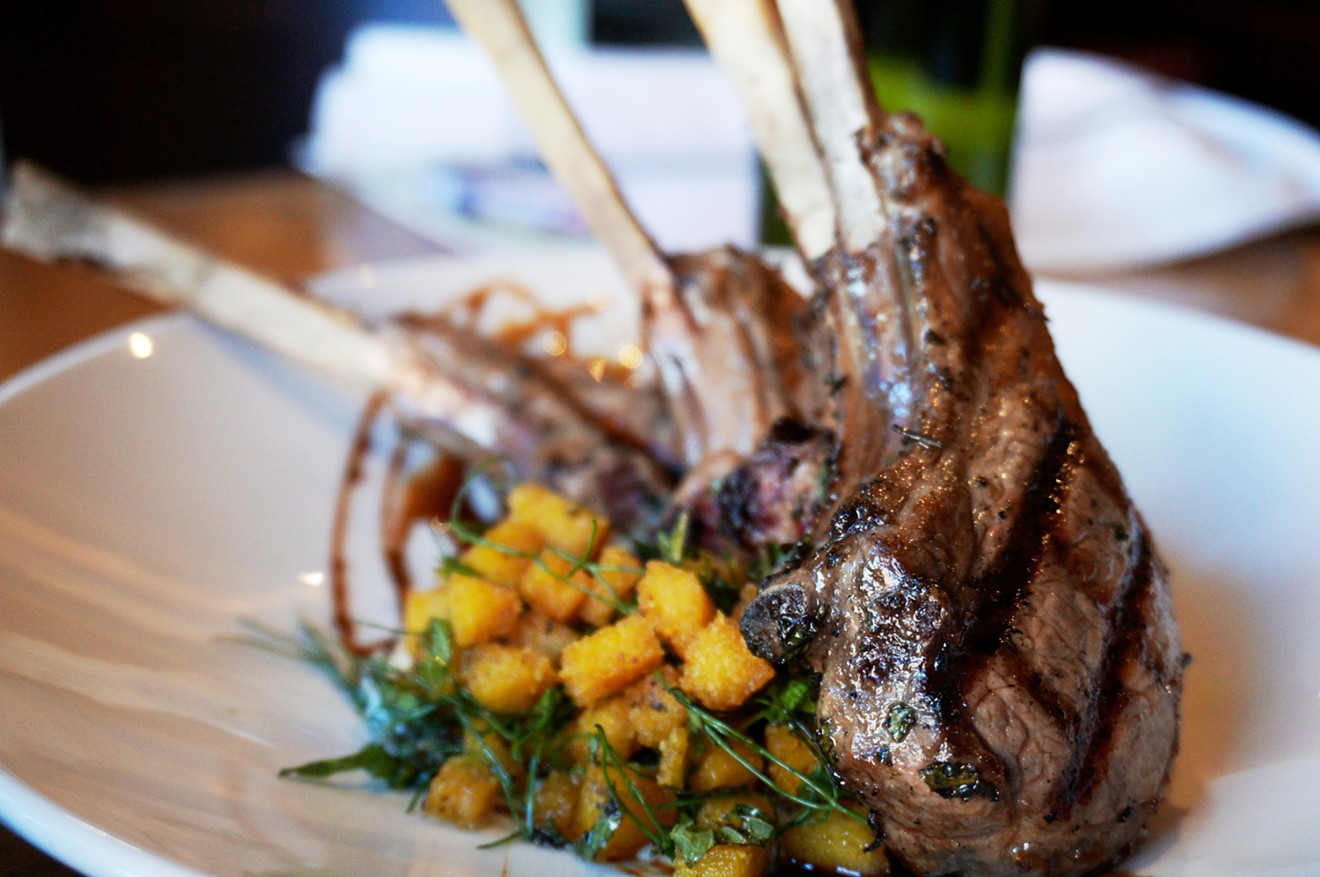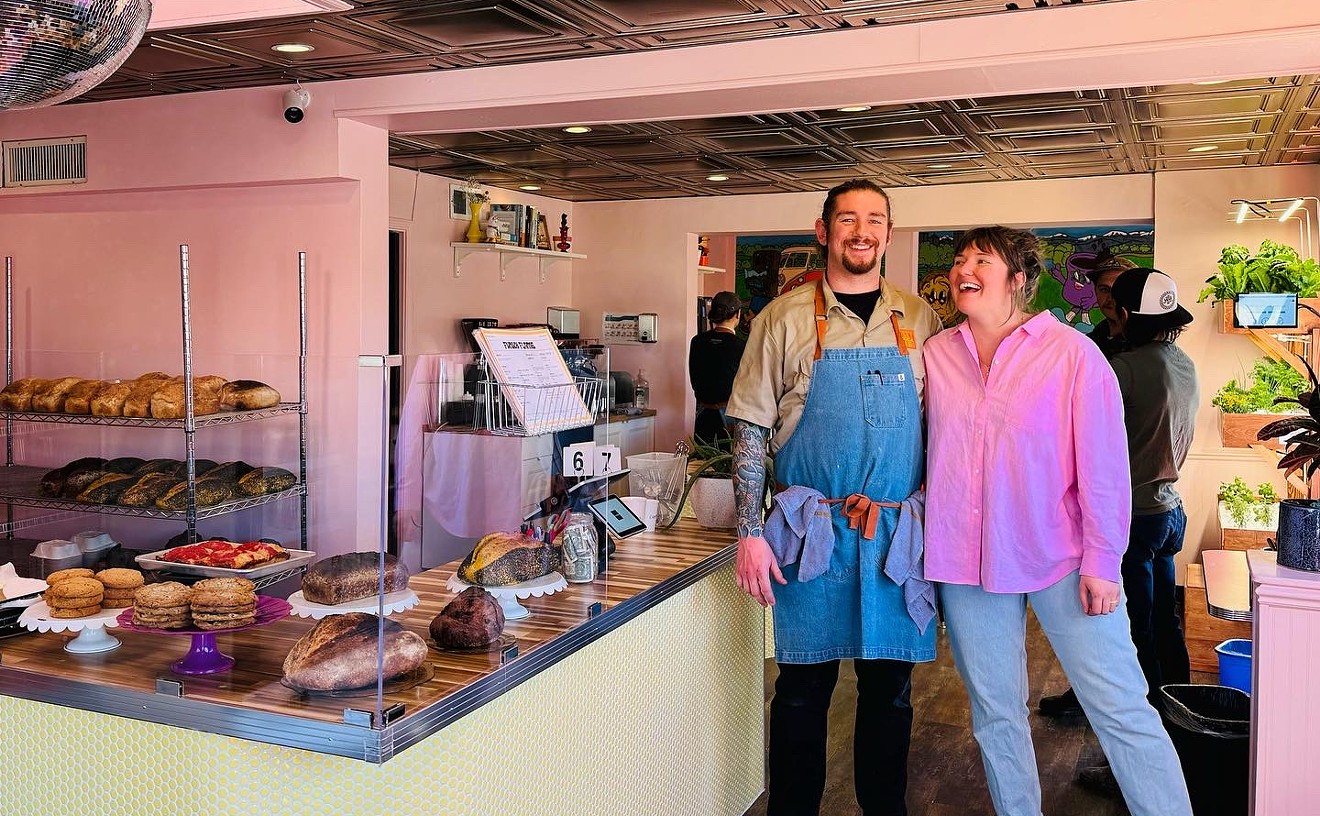How do owners keep their places fresh and relevant? Here are success stories from five restaurants that have marked anniversaries ranging from seven all the way up to fifty years.
Lon Symensma
ChoLon Modern Asian
1555 Blake Street
Chef Lon Symensma came to Denver in 2010 from New York City, where he had already helmed big-name eateries like Buddakan for other restaurateurs, with the intent of opening his own restaurant. He wanted the chance to rise to the top of a smaller, upcoming city rather than grinding away for years in Manhattan. “You have to remember that the economy was at the lowest,” the chef points out. “Restaurants in New York were closing left and right.”
In Denver, he saw an opportunity to showcase his prowess in the cuisines of Asia while giving the city something new: an upscale, Asian-themed restaurant where family-style plates would hit the middle of the table for everyone to share. Enter ChoLon, his restaurant at 1555 Blake Street. But after three months, customers weren’t showing up in large enough numbers, and Symensma wondered if he’d have to shut the place. A turnaround came before the year was out, though; he attributes it to landing at number four on a list of the 25 best restaurants in Denver. Business grew from there, and he says revenue has increased every year since without ever falling back.
Symensma now considers ChoLon a member of Denver’s elite restaurants, but he knows success is not guaranteed going forward. “We established our flagship, and we know that we can never compromise what we started if we want to continue to grow,” he says. “If we slide at all, we know we’re growing too fast and have to refocus.”
In some ways, a five- to ten-year-old restaurant is in the worst position: The excitement of a young, fresh eatery is gone, but the place has not yet achieved the status of a classic. Symensma has continued to refresh the design of ChoLon and has reconfigured more than once to eliminate awkward tables, reduce noise level, add more seating options to suit different needs and create better flow for staff. He also believes in innovating, and has never reintroduced an old dish, even while keeping customer favorites.
Even though a rash of lavish new restaurants have opened downtown, Symensma says he sees them as a draw rather than a threat. “When beautiful new restaurants open up in spaces where mediocre places should have closed a long time ago, it means that Denver is getting better and better,” he concludes.
Alex Seidel
Fruition
1313 East Sixth Avenue
Fruition debuted in a tiny space at 1313 East Sixth Avenue in 2007; it celebrated ten years in business last February by serving dinner prepared by ten past and present chefs. Even in celebration, chef/owner Alex Seidel was cooking for guests, something that initially was his only focus at Fruition. “I was clueless; I’d never even dreamed about opening my own restaurant,” he recalls. “All I cared about was that plate of food.”
Despite having to learn how to run a business along the way, Seidel notes, “In ten years, we’ve never had a year that’s gone backwards.” He attributes that success to continued conversations with his team. “We just always talk about what we’re bringing — we’re not satisfied or set in our ways,” he says. “There has to be evolution; there has to be change. We’re not the new guy on the block anymore.” Even with a tiny kitchen that has “been offering seven appetizers and seven entrees for ten years,” mostly because of a lack of space, Seidel says he knows that mixing things up and adding new options will be critical for future success.
Fear was what drove the chef in the early days of his restaurant — fear of not putting out the best food possible, and fear that guests wouldn’t respond positively. “I don’t feel like I live in a stressful way,” he adds, “but I don’t think it ever gets easy. It’s always hard, because it’s a hard job.”
His advice to young chefs considering opening their own restaurant? “Wait,” he says. “It’s easy to say, ‘Yeah, I can do this’ — because I said the same thing. But ask yourself, ‘How am I a good leader to my people now?’” The answer, he concludes, is to look for ways to improve how you do things — whether you’re a chef or a GM or a bar manager — before jumping into something new.

A modern remake of beef Wellington shows the balance of tradition and experimentation at Mizuna.
Mark Antonation
Mizuna
225 East Seventh Avenue
Frank Bonanno opened his first restaurant, Mizuna, at 225 East Seventh Avenue in 2001; he followed up with Luca d’Italia — now simply Luca — around the corner two years later. Over the past sixteen years, Mizuna has built a reputation as one of the top destination spots in the city, but the chef/restaurateur says that modern diners aren’t as keen on special-occasion restaurants, preferring a more casual experience, even when they’re laying down big money for exquisitely prepared food. So staying on the radar means more than what it took to get past fifteen years in the first place: “Good luck, great guests and just staying relevant,” as Bonanno puts it.
As a result, Bonanno’s restaurants focus on what customers want while remaining true to the mission. “Keeping it sharp and clean and fresh [means] you set a goal for what you want to be, and you never lose sight of that goal,” he explains.
For Mizuna’s fifteenth anniversary, Jacqueline Bonanno, Frank’s wife and business partner, redesigned the dining room and bar, while the staff implemented a new cocktail program and menu, striking a delicate balance between “keeping things on the menu that people love” and continuing to innovate with new dishes. “At Luca, we’re embracing changes in the neighborhood,” Bonanno adds. Part of that is opening garage doors and adding a salumi station in the dining room to appeal to new, young neighbors, and part of it is refocusing attention on Luca’s strengths, like handmade pasta and an impressive wine list, while making sure the price point isn’t intimidating.
Bonanno’s success is evident in Denver’s current restaurant scene. “We’ve had fourteen chefs go off and open their own restaurants,” he points out. But he’s not about to get complacent. “Even today, you don’t think of next year,” Bonanno says. “You think about how to get better right now.”
Josh Wolkon
Vesta
1822 Blake Street
Josh Wolkon was 25 in 1997 when he opened Vesta at 1822 Blake Street, halfway between a blossoming Larimer Square and the newly hot Ballpark neighborhood. Twenty years as an owner in the restaurant business seems like a miraculous feat, but Wolkon doesn’t think there’s any magic to success. “This is no secret,” he says. “It starts with people and how you treat people — your staff as well as your guests. You’ve got to take care of your people.”
So he makes sure the staff at all of his restaurants (which now include Steuben’s Uptown, Steuben’s Arvada and Ace Eat Serve) are fresh and ready to work. The day after Labor Day this year, he closed his restaurants for an all-employee party, and he also encourages a cleanse week, giving employees who want to participate up to $100 each in gift cards for spas, juice bars and healthy-eating establishments like Vital Root.
The explosion of new restaurants in Denver hasn’t made things any easier for veteran eateries. Wolkon loves to check out the scene, but he also tries to hit the places that helped build that scene, places that, like Vesta, have withstood the powerful forces of time and trends. “Those restaurants that have soul — and the ones that are ingrained as part of the community — are the ones that last,” he notes.
“When we celebrated our twentieth anniversary, my toast was not to us at twenty years,” he adds, “but to the other places that have made it thirty, forty years or more.”
Sue Romano-Calhoun
Romano’s Italian Restaurant
5666 South Windermere Street, Littleton
At a certain point, a restaurant stops being a reflection of the personality of one chef or owner and becomes an institution, a family affair that outlasts changes and trends. Romano’s, founded at 5666 South Windemere Street in Littleton fifty years ago by Neil and Ellie Romano, is one such place. Now run by a second generation, siblings John Romano, Nick Romano and Sue Romano-Calhoun, the Italian eatery attempts to please generations of regular customers while drawing in new ones, too.
Sue Romano-Calhoun was practically raised at Romano’s; she left for a time but eventually returned to help her brothers run the business. “It’s important to pass along to the next generation,” she says. “My mom and dad did a great job. For my brother, John, it’s the only job he’s ever had. The family and the restaurant — it’s all intertwined, and it’s all one thing.”
Fifty years ago, the restaurant landscape was very different, both in the city and the suburbs. “Littleton was more of a small town,” Romano-Calhoun recalls. “There wasn’t as much competition, so you had more time to get your feet under you. Now you see restaurants close after less than a year.” But things weren’t easy for her parents, either. They barely had two dollars in their pockets when they decided to open Romano’s, and they had to borrow money from a relative to get the place going. They paid the $1,000 loan back before the end of the first year, though.
Romano-Calhoun has paged through menus from the early days, menus that offered little more than pizza, pasta, meatballs and ravioli. The kitchen has added new dishes over the years — eggplant was a bold move in the 1980s — to keep things fresh, but tradition is not to be messed with. “People need to know it’s going to be the same every time they come in,” she says. “And the atmosphere is a big part of maintaining familiarity.”
Still, over fifty years, the customer base turns over, and it’s important to bring in new guests. Romano’s did that by embracing social media and hosting fundraisers for nearby elementary schools. Young families with kids at the schools who had never heard of Romano’s quickly become regulars because of the family’s commitment to the community.
Now the Romano family is looking to pass the restaurant on to a third generation. Romano-Calhoun and her brothers have eight daughters between them; Nick’s daughter Jordan is already a full-timer with interest in continuing the legacy. And the others? She speculates that “maybe they’ll do their own thing for a while and then come back to the restaurant after a time, like I did.”















